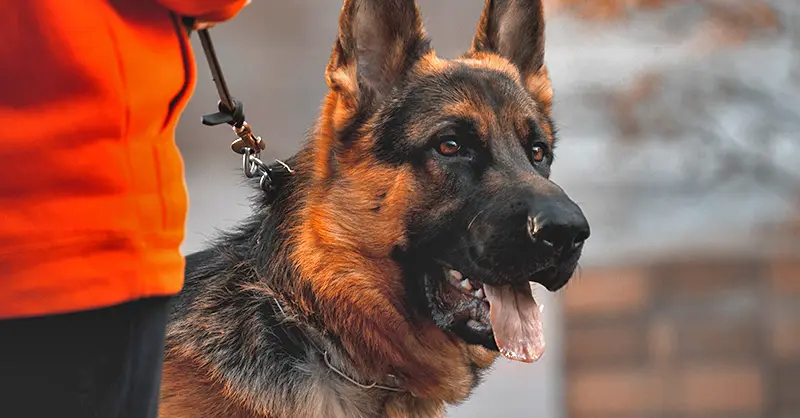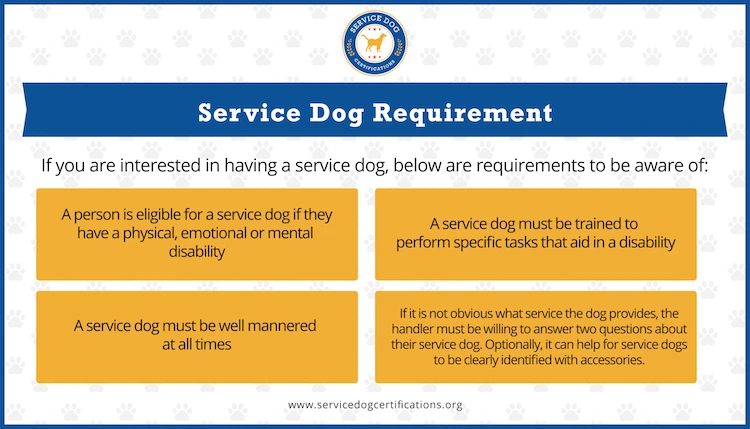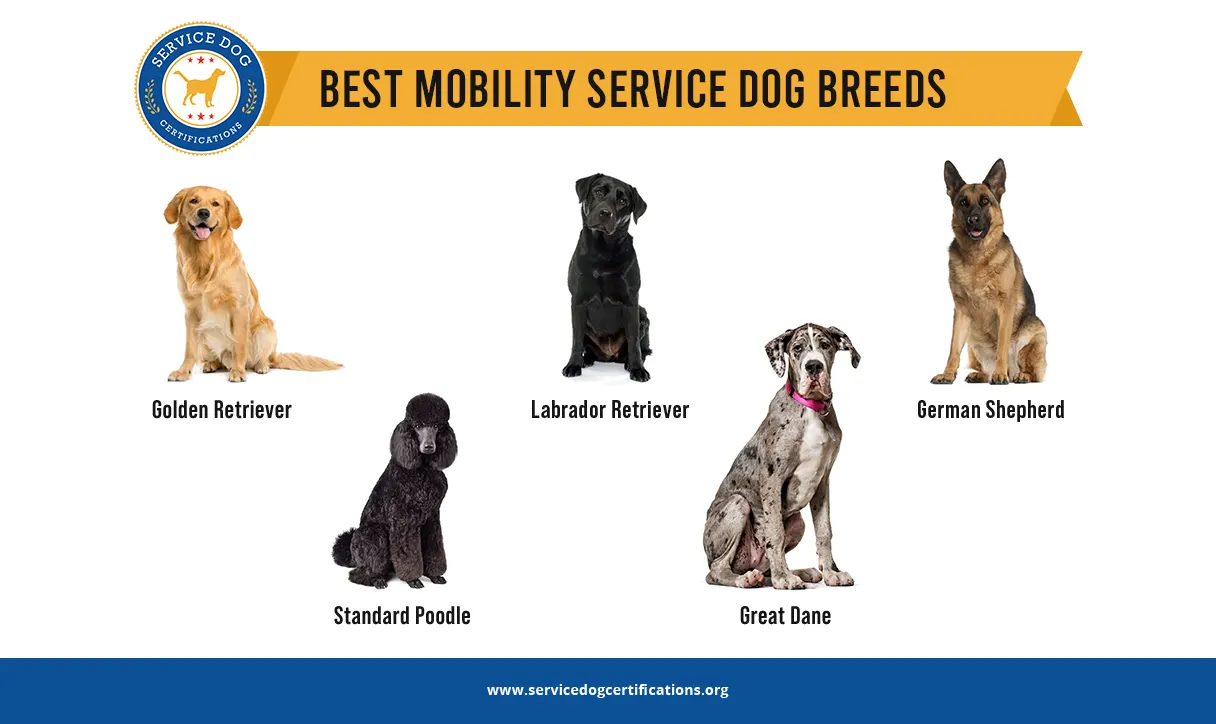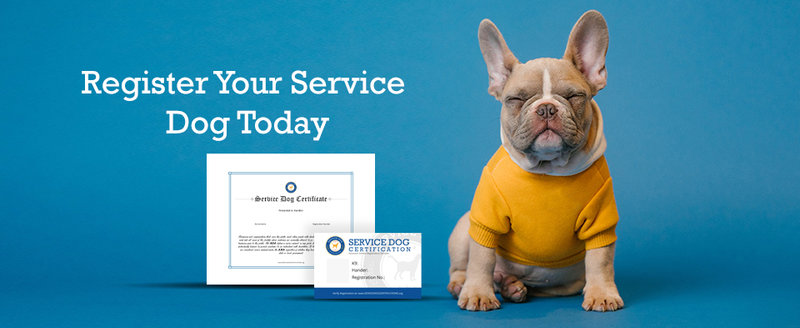Home Page › Blog › Service Dogs for Mobility Issues
Service Dogs for Mobility Issues

For people with mobility issues, a service dog can provide life-changing help. This assistance animal will help with daily tasks, like retrieving items, helping with balance, or opening doors in public places that would otherwise be of great difficulty for people with mobility issues. A service dog that is specialized in mobility issues suffered by their handler is called a mobility service dog.
What is a Mobility Service Dog?
Service dogs, in general, perform many functions for individuals with disabilities. Some help people with visual impairments get around, while others provide psychological support for people with anxiety or other conditions. A mobility service dog can help you maintain your independence by helping with tasks that may be difficult for you to complete on your own.
For example, if you use a wheelchair or powerchair, you may have difficulty reaching items higher up in your home or items you’ve dropped on the floor. A mobility assistance dog can get these items for you. Because they’re trained to support your movement, whether you’re using a wheelchair, a walker, or a cane, they can help with various other tasks in the home. Your mobility service dog can turn lights on and off, open and close doors and cabinets, and find others in the house when you need more complex help.
Here are some jobs a mobility service dog may be able to help you with:
- Support when you’re dressing and undressing
- Giving support/stability while walking and using stairs
- Fetching a phone
- Hitting elevator buttons
- Opening and closing doors and drawers
- Hitting automatic door openers
- Carrying bags and small objects
Mobility assistance dogs can also help you use public transportation, like planes, trains, or buses. After a service dog is thoroughly trained and has passed a public access test, they can accompany you into any public place where other animals usually are not allowed to go.
Who Might Benefit From a Mobility Assistance Dog?
Service dogs may be helpful for people with a variety of mobility challenges. Under current laws, a person requesting a mobility service dog must have a developmental, physical, or psychiatric disability that affects ambulation, mobility, or maneuverability.
This can include difficulty maintaining your balance, walking from one place to the next, requiring medical assistance during emergencies, and other difficulties getting around or performing everyday tasks.
Conditions that a mobility service dog may be able to help you with include, but are not limited to:
- Brain injury
- Arthritis
- Cerebral palsy
- Coordination issues
- Fibromyalgia
- Gait difficulties
- Balance issues
- Multiple sclerosis
- Muscular dystrophy
- Neurological disorder
- Spina bifida
- Heart problems
- Spinal cord injury
- Vertigo
In general, any condition that makes it hard for you to continue to live independently may allow you to work with a mobility service dog. These dogs are very versatile and can help with various situations. For example, a support dog can assist you if you have prosthetics or use assistive devices like a wheelchair, powerchair, cane, walker, crutches, or braces.
If you need help with balancing, standing up, moving around, retrieving items, interacting with people and the environment, monitoring medical alerts, or communicating in emergency situations, you may benefit from a mobility service dog.
ServiceDogCertifications.com
What Breed of Dog Makes a Good Mobility Service Dog?
Most dog breeds can be trained to be service dogs, but you’ll probably want to choose a medium to a large dog who can reasonably perform all the tasks you need. For example, you’ll want a dog who can reach doors that need opening.
Below is a selection of dog breeds with the size and temperament to make great mobility service dogs:
- Golden Retriever – These large dogs can brace a disabled person, are easy to train, and have the right temperament.
- Labrador Retriever – Like the Golden Retriever, Labrador Retrievers have the perfect size and temperament for mobility-challenged individuals.
- German Shepherd – Protective and alert, these dogs are also smart as a whip.
- Standard Poodle – Poodles are intelligent, have the right size, and do not shed, which is perfect for those with allergies
- Great Dane – These extra large dogs can assist taller people with disabilities. Great Danes also make great indoor dogs.
Your Mobility Service Dog is Your Companion
It’s important to remember that with every great mobility service dog comes great responsibility for the dog. A strong bond and trust between your dog and you are paramount to making the relationship work and having the dog perform the tasks when you’re in need.
Training your dog to become the mobility service dog you need may take time and patience. And it’s crucial to never lose focus on the primary purpose of your mobility service dog when interacting with them. However, it’s also important to play with your dog and show them affection when they’re not working. This helps with bonding and also rewards the dog for all the time they spend assisting you. And since your dog is working hard for you, you’ll want to choose good quality pet food to keep them healthy.
Having a loyal, hard-working companion like a mobility service dog by your side will not only provide a lasting friendship but also improve your quality of life in ways you may not achieve by yourself.
Show everyone your mobility service dog is an important part of your life with your Service Dog ID. Get your mobility service dog registered below.
About the Author: The writing team at Service Dog Certifications is made up of folks who really know their stuff when it comes to disability laws and assistance animals. Many of our writers and editors have service dogs themselves and share insights from their own experiences. All of us have a passion for disability rights and animals.
4 comments
Leave a Reply Cancel reply
Latest Posts

How to Bring a Service Dog to Disneyland
Trained service dogs are more than welcome to join their handlers at Disneyland. In this guide, we’ll explain Disneyland’s policies and give practical advice for bringing a service dog to Disneyland for the first time. Disneyland’s Service Dog Policies The Magic Kingdom is happy to welcome trained service dogs across most park locations! They kindly […]

Read More

Can Dogs Eat Tomatoes?
Yes! Dogs can safely enjoy tomatoes, but there are a few risks to be aware of so you can feed your dog responsibly. Fully ripe tomatoes (without the stems and leaves) can actually have nutrients that are good for your pup. Tomatoes have chlorogenic acid, an antioxidant that can have anti-inflammatory effects in cells. They’re […]

Read More

Can a Primary Care Doctor Write an ESA Letter?
Your family doctor, also called a primary care physician (PCP), can write a letter recommending an emotional support animal. We’ll explain what legally gives them that ability and explore what better options might be available for you. Why are Physicians Able to Write an ESA Letter? To turn your pet into an emotional support animal, […]

Read More









Can I use the same service dog for my mental health support that I would use for a mobility dog? I suffer for being in an electric wheelchair due to cerebral palsy and depression.
It is possible for a service dog to provide assistance for both a physical and mental health disability.
I need a service dog to help me with mobility also I am hearing impaired. Currently friends and neighbors help me but I would like to be independent. How do I get started applying for a service dog.
Unfortunately we do not provide referrals for service dog adoptions or training. Our services are for already qualified service dog owners. We wish you the best of luck however.